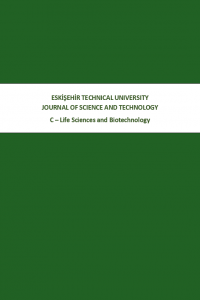Recep Sulhi ÖZKÜTÜK, Ersen Aydın YAĞMUR, Kadir Boğaç KUNT, Gizem Karakaş KARAKAŞ KILIÇ, Mert ELVERİCİ
TÜRKİYE'DEN BİLİNEN İKİ HARPACTEA BRISTOWE, 1939 (ARANEAE, DYSDERIDAE) TÜRÜNÜN YENİDEN BETİMLENMESİ
Türkiye'nin Harpacteinae faunasını belirlemeye yönelik yapılan arazi çalışmalarında daha evvel erkek bireyler üzerinden betimlenen Harpactea erseni ve H. pugio türlerine ait ilave örnekler toplanmış; her iki türün de taksonomik karakterlerini oluşturan erkek ve dişi bireylerinin üreme organlarına ait ayrıntılı fotoğraflar verilmiş, betimlemeler yapılmış ve türlerin dağılımı harita üzerinde gösterilmiştir. H. erseni, erkek üreme organı ve bazı diğer karakterleri itibarıyla, cins için tanımlanan rubicunda (D) tür grununa dahildir. Bununla birlikte yeni betimlenen dişi üreme organı, posteriyör spermatekasının tamamıyla sklerotize olması sebebiyle, lepida (C) tür grubu ile yakınlık göstermektedir. Bu durum makale içerisinde tartışılmıştır. H. pugio, dişi üreme organının posteriyör spermatekasında yer alan zarsı yapıdaki posteriyor divertikulum ve her iki eşeyinin sahip olduğu taksonomik karakterlerden dolayı rubicunda (D) tür grubu içerisinde değerlendirilmiştir
Anahtar Kelimeler:
Anadolu, Harpacteinae, Örümcek
REDESCRIPTION OF THE TWO HARPACTEA BRISTOWE, 1939 (ARANEAE, DYSDERIDAE) SPECIES KNOWN FROM TURKEY
During our field studies to determine the Harpacteinaae fauna of Turkey, additional samples of Harpactea erseni and H. pugio species described on male species were collected; detailed photographs constituting taxonomic characters of the reproductive organs of both male and female species were given and descriptions were made and distribution of the species was shown on the map. H. erseni belongs to the rubicunda (D) group which is defined for the genus, by the male reproductive organs and some other characters. However, the newly described female reproductive organ is closely related to the lepida (C) group because the posterior spermatheca is completely sclerotized. This situation is discussed in the article. H. pugio has been evaluated in the rubicunda (D) group due to posterior diverticulum in the crusted posterior spermatheca of the female reproductive organ and the taxonomic characteristics of the both sexes
Keywords:
Anatolia, Harpacteinae, Spider,
___
- World Spider Catalog. World Spider Catalog. Natural History Museum Bern, online at http://wsc.nmbe.ch, version 18.5, Erişim: 15.08.2017.
- Demir H, Seyyar O. Annotated checklist of the spiders of Turkey. Mun. Ent. Zool 2017; 12(2): 433-469.
- Le Peru B. The spiders of Europe, a synthesis of data: Volume 1 Atypidae to Theridiidae. Mémoires de la Société Linnéenne de Lyon 2011; 2: 1-522.
- Nosek A. Araneiden, Opilionen und Chernetiden. In Penther, A. und E. Zederbauer, Ergebnisse einer naturwissenschaftlichen Reise zum Erdschias-Dagh (Kleinasien). Ann. naturh. Hofmus. Wien 1905; 20: 114-154.
- Alicata P. Su una nuova specie di Harpactea (Araneae, Dysderidae) della Turchia. Animalia 1974; 1: 69-72.
- Brignoli PM. Ragni di Turchia IV. Leptonetidae, Dysderidae ed Agelenidae nuovi o interessanti di grotte della Turchia meridionale (Araneae). Quad. Speleol. Circ. Speleol. Rom 1978; 3: 37-54.
- Brignoli PM. Ragni di Turchia V. Specie nuove o interessanti, cavernicole ed epigee, di varie famiglie (Araneae). Rev Suisse Zool 1978; 85: 461-541.
- Brignoli PM. Spiders from Turkey, VI. Four new species from the coast of the Black Sea (Araneae). Bull. Br. Arachnol. Soc 1979; 4: 310-313.
- Lazarov S, Deltshev C. New data for Harpactea sanctaeinsulae Brignoli, 1978 and description of the unknown female (Araneae, Dysderidae). Turk J Arach 2008; 1(1): 67-69.
- Lazarov S. New faunistic data for Harpactea babori (Nosek, 1905) and description of the unknown female (Araneae, Dysderidae). Turk J Arach 2010; 3(1): 9-12.
- Bayram A, Kunt KB, Yağmur EA. A new spider species of the genus Harpactea (Araneae; Dysderidae) from southeast Anatolian region of Turkey. Turk J Arach 2009; 2(2): 1-4.
- Kunt KB, Özkütük RS, Kaya RS. A new species of Harpactea (Araneae, Dysderidae) from Aegean region of Turkey. ZooKeys 2010; 59: 39-45.
- Kunt KB, Elverici M, Özkütük RS, Yağmur EA. Two new species of Harpactea (Araneae, Dysderidae) from Turkey. ZooKeys 2011; 145: 129-141.
- Kunt KB, Özkütük RS, Elverici M. Harpactea ballarini sp. nov., a new dysderid (Araneae, Dysderidae) spider from Turkey. Turk J Zool 2013; 37: 238-241.
- Özkütük R, Elverici M, Marusik Y, Kunt K. A new species of Harpactea Bristowe, 1939 from Turkey (Araneae: Dysderidae). Biodiversity Data Journal 2015; 3: e4419.
- Kunt KB, Özkütük RS, Elverici M, Marusik YM, Karakaş G. Harpactea karaschkhan sp. n., a new cave-dwelling blind spider species from the Mediterranean Region of Turkey. J Caves Karst Stud 2016; 78 (1): 36–40.
- Varol Mİ, Akpınar A. Two new spider species of the family Dysderidae (Araneae) from Turkey. Zool Middle East 2016; 62(2): 171-176.
- Özkütük RS, Kunt KB, Karakaş G, Danışman T. Redescription of Harpactea korgei Brignoli, 1979 (Araneae: Dysderidae) with the first description of the female. Arthropods 2015; 4(2): 32-37.
- Demircan N, Topçu A. A contribution to the spider fauna of the European part of Turkey (Araneae). Serket 2015; 14(4): 176–183.
- Chatzaki M, Arnedo MA. Taxonomic revision of the epigean representatives of the spider subfamily Harpacteinae (Araneae: Dysderidae) on the island of Crete. Zootaxa 2006; 1169: 1-32.
- Lazarov S. A new spider species from Bulgaria, Harpactea terveli sp. n. (Araneae: Dysderidae). Int. J. Acad.Res 2009; 1(2): 96–98.
- Deeleman-Reinhold CL. The genus Rhode and the harpacteine genera Stalagtia, Folkia, Minotauria, and Kaemis (Araneae, Dysderidae) of Yugoslavia and Crete, with remarks on the genus Harpactea. Revue Arachnologique 1993; 10: 105-135.
- Alicata P. Le Harpactea (Araneae, Dysderidae) della fauna italiana e considerazioni sulla loro origine. Atti Accad.gioenia Sci.nat 1966; (6)18: 190-221
- ISSN: 2667-4203
- Yayın Aralığı: Yılda 2 Sayı
- Başlangıç: 2010
- Yayıncı: Eskişehir Teknik Üniversitesi
Sayıdaki Diğer Makaleler
Yasemin KEMEÇ HÜRKAN, Kaan HÜRKAN, Cüneyt AKI
TÜRKİYE'DEN BİLİNEN İKİ HARPACTEA BRISTOWE, 1939 (ARANEAE, DYSDERIDAE) TÜRÜNÜN YENİDEN BETİMLENMESİ
Recep Sulhi ÖZKÜTÜK, Ersen Aydın YAĞMUR, Kadir Boğaç KUNT, Gizem Karakaş KARAKAŞ KILIÇ, Mert ELVERİCİ
NANE UÇUCU YAĞININ MIKROKAPSÜLASYONUNDA ZEIN-KAZEIN KOMPLEKSİNİN KULLANIMI
Kök Hücrelerin Toksikoloji Çalışmalarında Kullanımı
